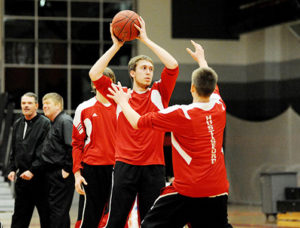Five tips to create a positive practice environment
As leaders, we must strive to create a positive environment that allows our players to thrive. I take a lot of pride in the fact that my players enjoy practice. That doesn’t mean practice is not difficult, but as coaches we can create an environment that’s both positive and challenging.
 Here are five strategies to create a more positive environment for your team.
Here are five strategies to create a more positive environment for your team.
1. Don’t be a ‘helicopter coach.’
We hear this term used with parenting. A “helicopter parent” is one who is controlling, too involved and hovers over their child’s every move. We can act the same way.Some coaches won’t let athletes play pickup games without their presence, or they won’t even let players put up shots unless they know about it. Allow your players to put in extra work after practice, or walk off the court to let them shoot around without your oversight. Have an open gym on the weekend, and let them decide what shots they want to take. Let them be that little girl or boy who’s in the driveway using their imagination, or allow them to gather some friends at a local park to play a scrimmage game. Give them the freedom to play the game they love.
2. Adopt an open-door policy.
One of the first policies we introduce to new players is our door is always open unless it’s locked. We want players to feel like they have access to their coaches.
Our office is always full of players. They lounge on the couch, watch TV or just hang out. This not only creates a positive environment, but it also provides opportunity for you to establish relationships with players that goes beyond 94 feet.
3. Practice constructive criticism.
We all get frustrated, and most of us have regrettably lashed out in anger. If your players come to practice fearing what kind of mood you’re in, this can create a toxic environment.
Constructive criticism is intended to provide specific instruction leading to improvement. The “sandwich” method is a great tool to help provide constructive criticism. Say something positive, follow by describing what needs improvement, and finish with more positive feedback. For example, “Reagan, your hustle and effort is there, but you need to do a better job of using the screen. Set your defender up first, then go shoulder-to-shoulder off of the screen. You can do this, because I have seen you do it the correct way numerous times.”
4. Implement competitive drills; team vs. clock.
I love to compete, and I love to coach players who are competitors. There always comes a point during the preseason where we’re all ready to play someone other than our teammates. Implementing team drills, where the team competes together with time on the clock and a goal in mind, is a great way to create not only a positive environment but also team unity. Your players will love these drills and ask you to implement them in practice every week.
5. Whistle while you work.
I don’t know about you, but I grew up listening to music in every aspect of life. I often say music was my first love. I’m a coach’s kid, and my dad has coached at the same school for 40 years, so I have seen a lot of practices in my days.
My father’s practices are so exciting for his players. When I was younger, he would have music everywhere, and that tradition continues today. Music is on the court, in the locker rooms and on the bus. I think most of the reason he plays music in practice is because of his own love for music. He may not have realized this 40 years ago, but having music in practices makes for an exciting and positive environment. When I became a coach, it was inevitable I would implement music into our program’s everyday routine. It’s amazing the difference it creates in an athlete’s demeanor and work ethic when music is playing compared to when it’s silent.
Games are not quiet. There are people in the stands cheering, student sections that are obnoxious, small courtside bands, and music during timeouts and halftimes. I utilize sound in our practices by shooting pressure free throws with loud music. I even choose music that most of my players dislike, including Christmas music, Johnny Cash or heavy metal. Regardless of the scenario, when our players walk into practice or the weight room, they hear music. I make time for this small, but important, part of our program.
Ashley Hutchcraft-Nance is the head girls basketball coach at Conway High School in Arkansas. She has led the Lady Cats to a state championship (2014) and two state runner-up seasons (2015, 2016).









